Every parent wants the best food for their baby. Babies grow fast, and they need healthy food for strong body and sharp mind. Today, many parents choose organic baby food.
But what is organic baby food? Why is it so popular? Which brands are safe? This blog will explain everything. We will talk about benefits, types, top brands, and also homemade organic baby food.
If you are a new parent, this guide is for you. It will help you make the right choice for your baby’s nutrition.
What is Organic Baby Food?
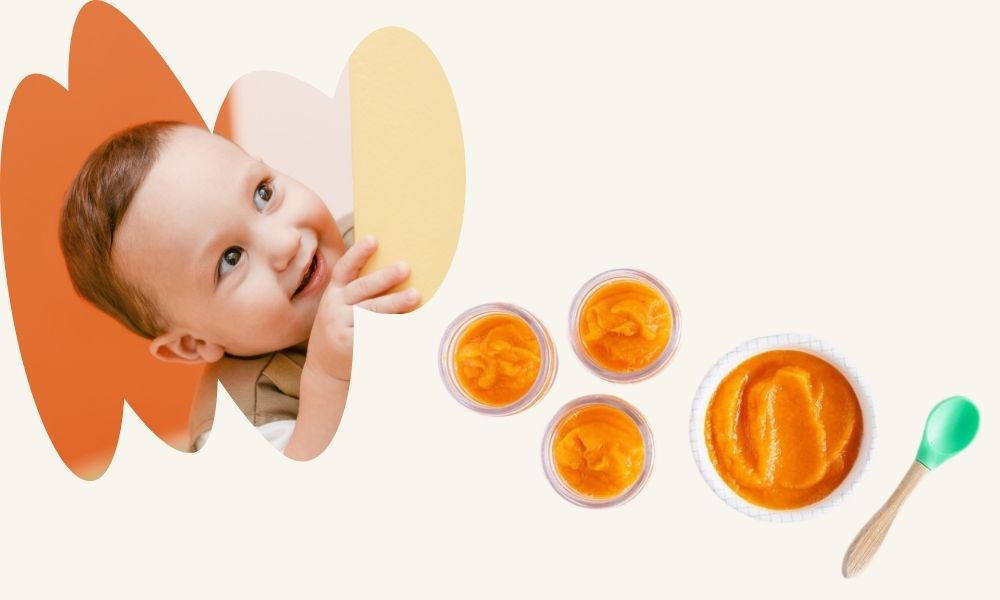
Organic food means food made without harmful chemicals, pesticides, or artificial colors. For babies, organic food is more safe because:
- It has natural ingredients.
- It does not have GMOs (genetically modified organisms).
- It is free from preservatives.
Key Features of Organic Baby Food
- Certified with USDA Organic or similar labels.
- Made from fruits, vegetables, whole grains.
- Safer for digestion and immunity.
- Eco-friendly and better for the environment.
Parents feel more relaxed when they give organic food because babies get pure nutrition without toxic chemicals.
Benefits of Organic Baby Food
Why should you choose organic food for your little one? Here are the main benefits:
Safe from Chemicals
Normal baby food may contain pesticides. But organic food avoids these. Babies have small bodies, so even a little chemical can be harmful. Organic food gives safety.
Rich in Nutrients
Organic food has more vitamins, minerals, and antioxidants. These help in baby’s growth, brain development, and energy.
Better Digestion
Babies have sensitive stomach. Organic food is soft, natural, and easy to digest. It helps avoid gas, colic, and allergies.
No Artificial Flavors
Some non-organic foods have flavor enhancers or sugar. These are not good for babies. Organic food is natural and has the original taste of fruits and vegetables.
Healthy Future
When babies eat clean food, they build strong immunity. This protects them from future diseases.
Types of Organic Baby Food
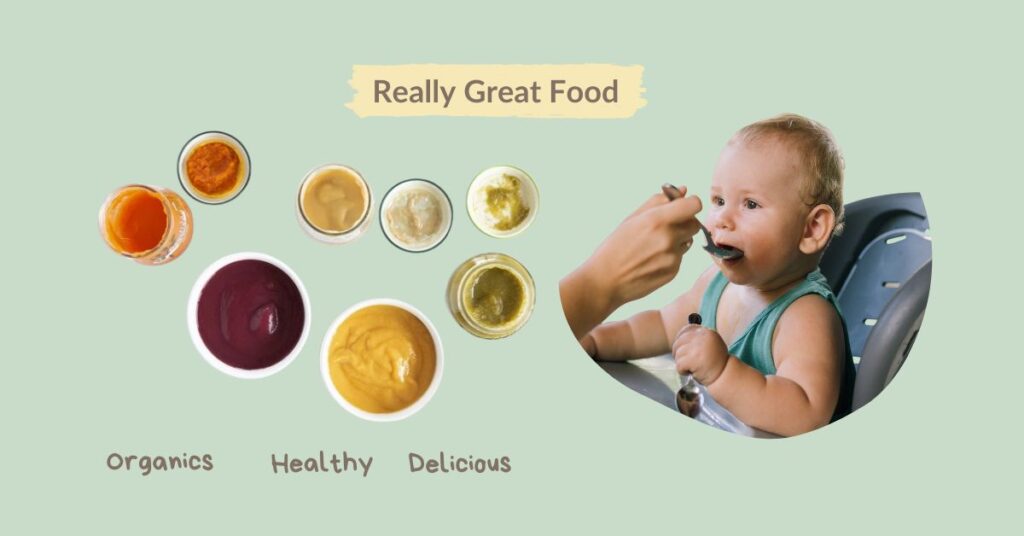
There are many types of organic baby food in the market. Parents can choose based on baby’s age and taste.
Organic Purees
- Made from fruits (apple, banana, mango).
- Made from vegetables (carrot, sweet potato, peas).
- Best for babies starting solid food.
Organic Cereals
- Rice cereal, oat cereal, barley cereal.
- Easy to mix with milk or water.
- Provides iron and fiber.
Organic Snacks
- Puffs, crackers, teething biscuits.
- Good for babies above 8 months.
- Easy to eat and soft to chew.
Organic Baby Formula
- For babies who need milk substitute.
- Made from organic cow’s milk or plant-based sources.
- Always choose age-appropriate formula.
How to Choose the Best Organic Baby Food
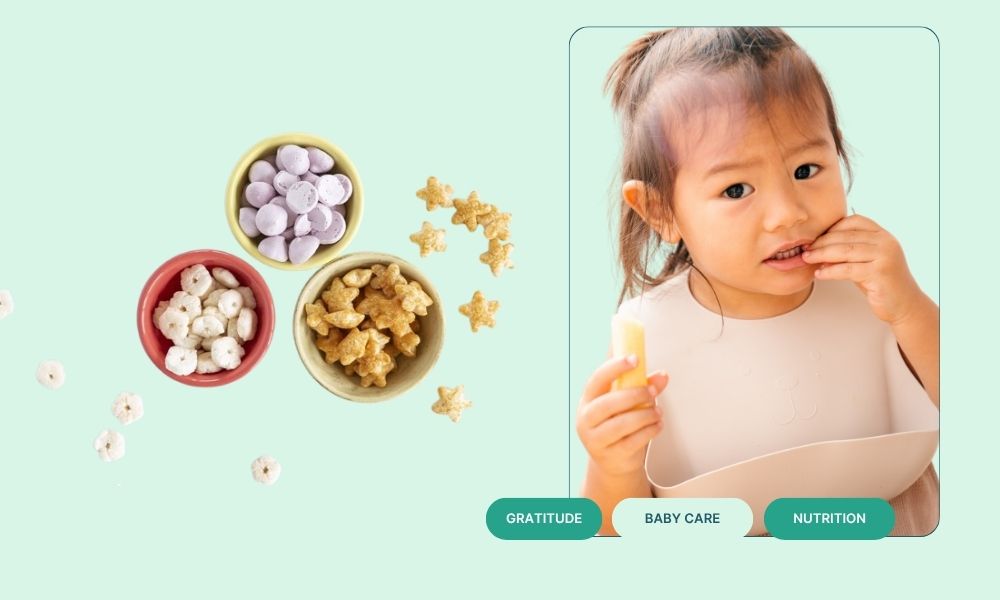
Choosing the right food can be confusing. Here are some tips:
- Check for USDA Organic label.
- Look for non-GMO, no added sugar, no salt.
- Choose BPA-free packaging (safe for health).
- Match food with baby’s age (Stage 1, Stage 2, Stage 3).
- Always read the ingredients list carefully.
Top 10 Best Organic Baby Food Brands
When parents look for the best organic baby food, they want trustworthy brands. These brands must be safe, healthy, and loved by babies. Below is a list of the top 10 brands with simple reviews.
Happy Baby Organics
Happy Baby is one of the most popular organic baby food brands.
- Uses non-GMO ingredients.
- Offers purees, puffs, cereals, and snacks.
- Rich in vitamins like Vitamin A, C, and D.
- Packaging is BPA-free.
Parents love Happy Baby because it is both nutritious and affordable.
Earth’s Best Organic
Earth’s Best has been trusted for more than 30 years.
- Provides organic formula, jars, cereals, and snacks.
- Made with whole grains, fruits, and vegetables.
- Free from pesticides and artificial flavors.
This brand is loved by parents who want classic organic options at a good price.
Gerber Organic
Gerber is a very famous baby food company. They also make a USDA-certified organic line.
- Offers purees, cereals, snacks, and pouches.
- Provides stage-based food for babies (Stage 1, 2, 3).
- Has iron-rich cereals for brain development.
Parents trust Gerber Organic for its wide range and easy availability in stores.
Beech-Nut Organics
Beech-Nut focuses on real food taste.
- Simple purees with only 1–2 ingredients.
- No added sugar or salt.
- Glass jar packaging (eco-friendly).
Parents choose Beech-Nut because babies enjoy the natural taste.
Plum Organics
Plum Organics is modern and innovative.
- Known for organic pouches.
- Mix of fruits, veggies, grains.
- Non-GMO, BPA-free packaging.
- Special blends for older babies and toddlers.
Parents like Plum Organics because it is convenient for travel and on-the-go feeding.
Sprout Organic Baby Food
Sprout is another trusted organic brand.
- USDA-certified, non-GMO.
- Wide range of purees, snacks, and meals.
- Made with plant-based proteins like lentils and beans.
Parents prefer Sprout because it offers unique recipes beyond fruits and veggies.
Once Upon a Farm
This brand is co-founded by actress Jennifer Garner.
- Focuses on cold-pressed organic food.
- Fresh purees stored in the refrigerator.
- USDA organic, non-GMO verified.
- No preservatives, no added sugar.
Parents love Once Upon a Farm for its farm-fresh taste and nutrient-rich food.
Cerebelly
Cerebelly is different from other brands.
- Created by a neuroscientist mom.
- Organic pouches with 16 essential nutrients.
- Supports brain and body development.
- USDA certified, non-GMO, and clean label project verified.
Parents choose Cerebelly for its science-backed nutrition.
Holle Organic Baby Food
Holle is a European organic brand.
- Famous for organic baby formula.
- Also makes cereals, porridges, and snacks.
- Demeter-certified (biodynamic farming).
Parents trust Holle for its high European quality standards.
Little Spoon
Little Spoon delivers fresh organic baby food to your home.
- Subscription-based service.
- Offers purees, toddler meals, smoothies.
- No preservatives, no artificial flavors.
Parents like Little Spoon because it is freshly made and delivered straight to the door.
Comparison Table: Top Organic Baby Food Brands
| Brand | Products Available | Special Features | Packaging | Best For |
| Happy Baby Organics | Purees, cereals, snacks | Affordable, non-GMO | BPA-free | Everyday use |
| Earth’s Best | Formula, cereals, snacks | Trusted 30+ years | BPA-free | Classic organic choice |
| Gerber Organic | Purees, cereals, pouches | Stage-based nutrition | BPA-free | Easy to find |
| Beech-Nut Organics | Purees | Glass jars, real taste | Glass jars | Simple, natural taste |
| Plum Organics | Pouches, snacks | On-the-go convenience | BPA-free | Travel and outings |
| Sprout | Purees, snacks, meals | Plant-based protein options | BPA-free | Unique variety |
| Once Upon a Farm | Refrigerated fresh purees | Cold-pressed, no preservatives | BPA-free | Fresh, farm taste |
| Cerebelly | Pouches | Brain-boosting nutrients | BPA-free | Brain development |
| Holle | Formula, cereals | European quality | Eco packs | Formula + cereal lovers |
| Little Spoon | Purees, toddler meals | Home delivery, fresh food | Eco packs | Busy parents |
Why These Brands Are Best
All these brands are popular because they:
- Use organic fruits and vegetables.
- Avoid harmful pesticides and preservatives.
- Focus on baby health and growth.
- Provide safe packaging.
Parents can choose based on budget, availability, and baby’s taste preferenc
Homemade vs. Store-Bought Organic Baby Food
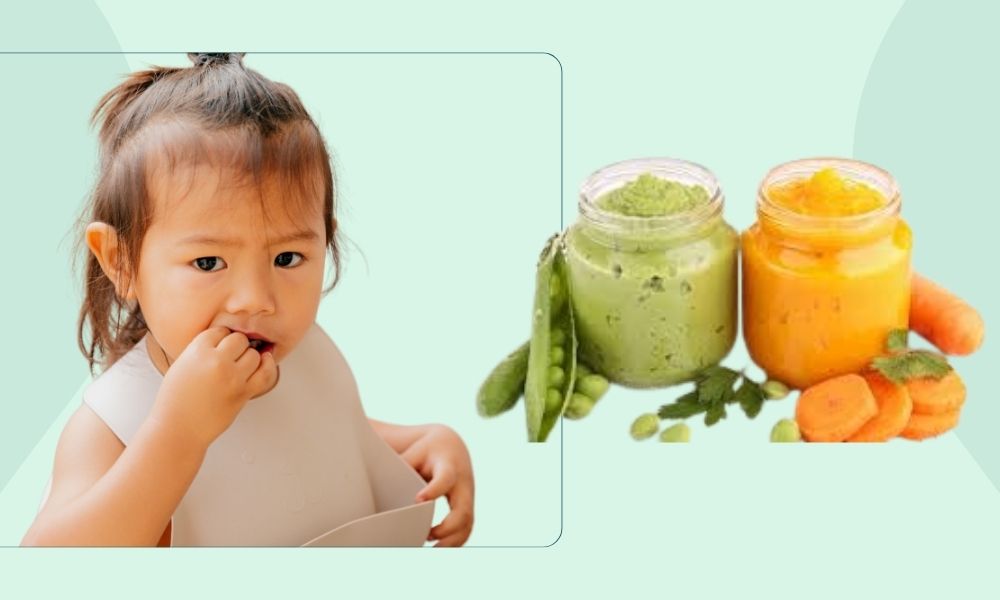
Parents often ask: “Should I make baby food at home or buy from the market?” The answer depends on time, budget, and lifestyle. Both options have pros and cons.
Homemade Organic Baby Food
Advantages:
- You control the ingredients.
- Always fresh and natural.
- Cost is usually lower than packaged food.
- You can make food that matches baby’s taste preference.
Examples of homemade organic baby food:
- Mashed banana (easy first food).
- Steamed carrot puree.
- Rice cereal made at home.
- Apple puree (boiled and mashed).
Disadvantages:
- Takes time and effort.
- Must be cooked carefully to avoid contamination.
- Storage is difficult (fresh food spoils fast).
9.2 Store-Bought Organic Baby Food
Advantages:
- Very convenient for busy parents.
- Comes in ready-to-eat jars or pouches.
- Long shelf life with safe storage.
- Brands provide age-appropriate stages.
Disadvantages:
- More expensive than homemade food.
- Some may have mild preservatives (though safe).
- Taste is less fresh compared to homemade.
Which is Better?
- For daily meals, homemade organic baby food is great.
- For travel, daycare, or busy days, store-bought organic food is helpful.
Many parents use both options together for balance.
Tips for Safe Homemade Organic Baby Food
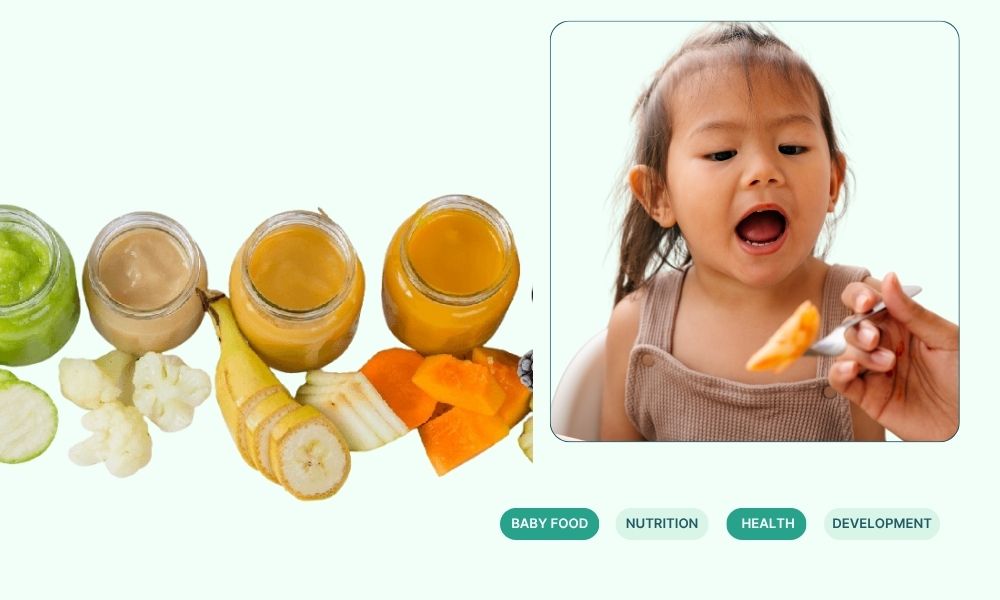
If you want to prepare at home, follow these simple tips:
- Wash fruits and vegetables very well.
- Use organic ingredients only.
- Steam or boil to make food soft.
- Mash or puree properly (no chunks for small babies).
- Do not add salt, sugar, or honey.
- Store in small glass containers for 1–2 days maximum.
Tips for Introducing Organic Food to Babies
Feeding a baby is a journey. You must go step by step.
When to Start
- Most doctors suggest starting solid food at 6 months.
- Before that, babies should only drink breast milk or formula.
Start with Simple Foods
- First, give single-ingredient organic foods like carrot puree, apple puree, or banana mash.
- Wait 3 days before trying another new food. This helps to check for allergies.
Watch for Allergies
Some babies are sensitive to certain foods. Signs include:
- Rashes on skin
- Gas or diarrhea
- Cough or swelling
If you see these, stop that food and consult a doctor.
Slowly Add Variety
- After 6–7 months: start mixing fruits and veggies together.
- After 8 months: add organic cereals, oats, and snacks.
- After 10–12 months: soft finger foods like organic crackers or teething biscuits.
Focus on Iron and Protein
Babies need iron-rich food for brain growth. Examples:
- Organic oatmeal
- Organic lentils puree
- Organic spinach mixed with apple
Protein is also important for muscle and body growth. You can add:
- Organic yogurt
- Mashed beans
- Small amounts of organic chicken puree (for older babies).
Do’s and Don’ts for Organic Baby Food
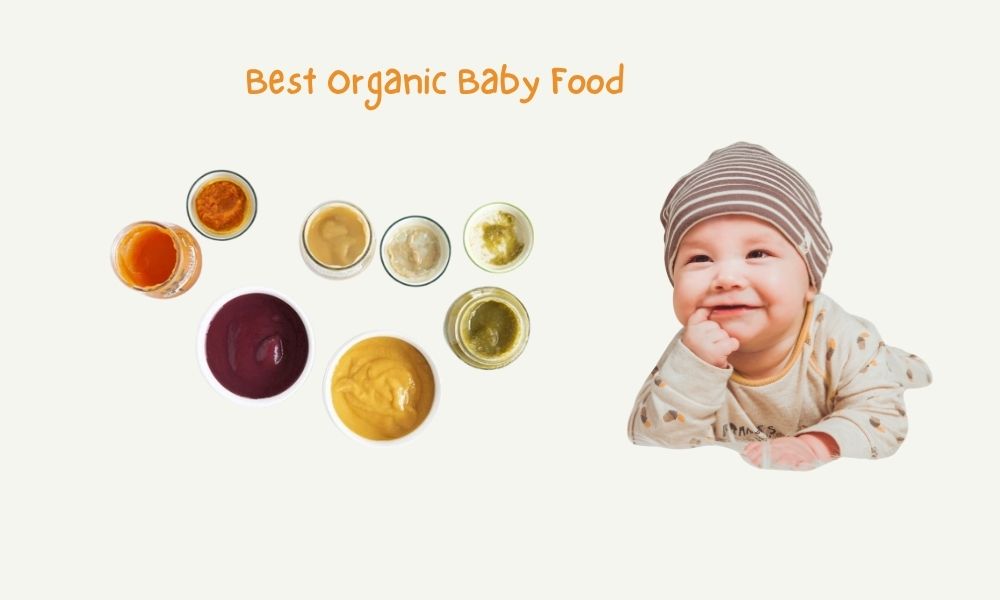
Do’s:
- Always choose certified organic products.
- Serve food in BPA-free bowls and spoons.
- Keep baby hydrated with water (after 6 months).
- Encourage baby to try different flavors.
Don’ts:
- Don’t add salt, sugar, or honey in baby food.
- Don’t give cow’s milk before 1 year (only formula or breast milk).
- Don’t use food with choking hazards (nuts, whole grapes, popcorn).
- Don’t force-feed. Let baby eat slowly and happily.
Parents’ Experience with Organic Baby Food
Many parents share that babies enjoy organic purees more because the taste is natural. They also notice:
- Less stomach problems like gas or constipation.
- Babies sleep better with healthy food.
- Parents feel relaxed because they know their child eats clean food.
FAQs About Organic Baby Food
Parents often have many questions before choosing organic food for babies. Here are some common FAQs:
Q: Is organic baby food really better?
Yes. Organic baby food is made without pesticides, GMOs, or artificial flavors. It gives safe nutrition and protects baby’s digestion and immunity.
Q: Is organic baby food expensive?
Yes, it can cost a little more than normal baby food. But many parents believe the health benefits make it worth the price.
Q: Can I feed non-organic food sometimes?
Yes, it is safe sometimes. But try to give organic food as much as possible, especially for fruits and vegetables.
Q: How long can I store opened organic baby food?
- If in pouch or jar: 1–2 days in the refrigerator.
- If homemade: 24–48 hours only.
Always check smell and texture before feeding.
Q: When should I start organic baby food?
Most babies can start organic purees at 6 months. Before that, only breast milk or formula.
Conclusion
Feeding a baby is one of the most important jobs for a parent. Choosing the best organic baby food helps your little one grow strong, healthy, and happy.
We learned that organic food is:
- Safer because it avoids chemicals and pesticides.
- Rich in nutrients, vitamins, and minerals.
- Easy to digest for small tummies.
- Better for the environment too.
There are many great brands like Happy Baby, Earth’s Best, Gerber Organic, Beech-Nut, Plum Organics, Sprout, Once Upon a Farm, Cerebelly, Holle, and Little Spoon. Each has its own strengths, but all are safe and nutritious.
Parents can also prepare homemade organic baby food for freshness and savings. Or they can choose store-bought options for convenience. Both are good when used wisely.
Final Thoughts
Every baby is different. Some babies like fruit puree, some prefer cereal, others enjoy mixed flavors. The key is to introduce slowly, watch for allergies, and always choose safe organic products.
Remember:
- Start simple (like apple or carrot puree).
- Add new foods step by step.
- Keep meals natural and chemical-free.
- Focus on iron, protein, and vitamins.
- Most importantly, let your baby enjoy the process.
As a parent, when you give organic baby food, you give more than just nutrition — you give your child a healthy start in life.

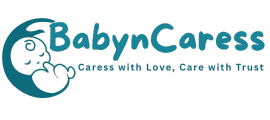








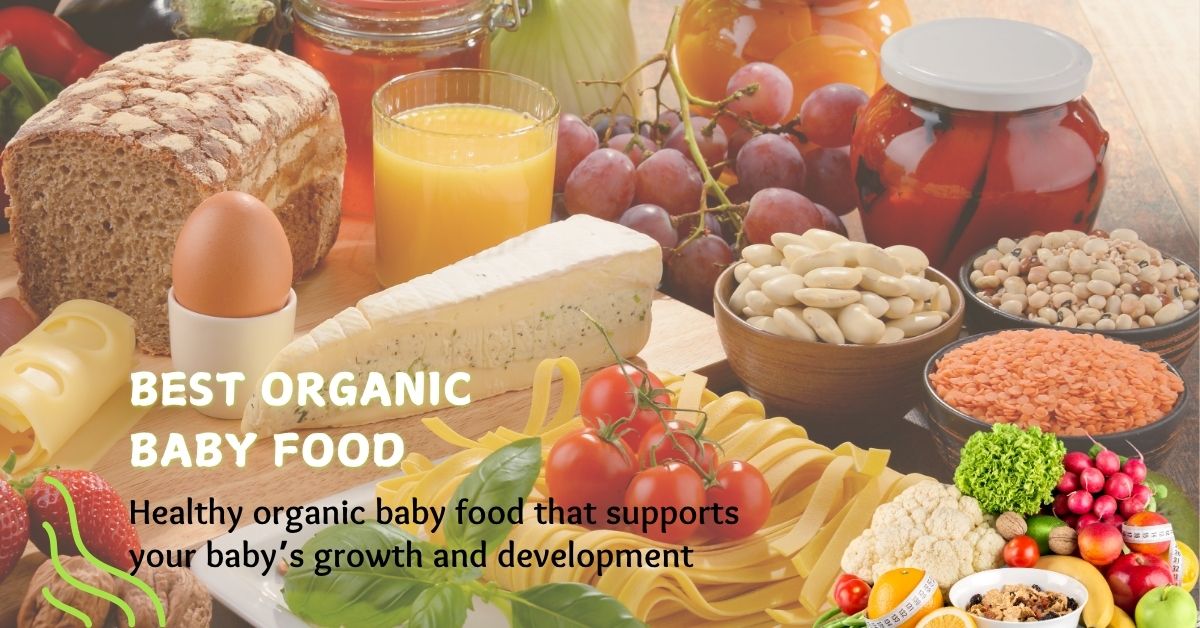





Leave a Reply
View Comments